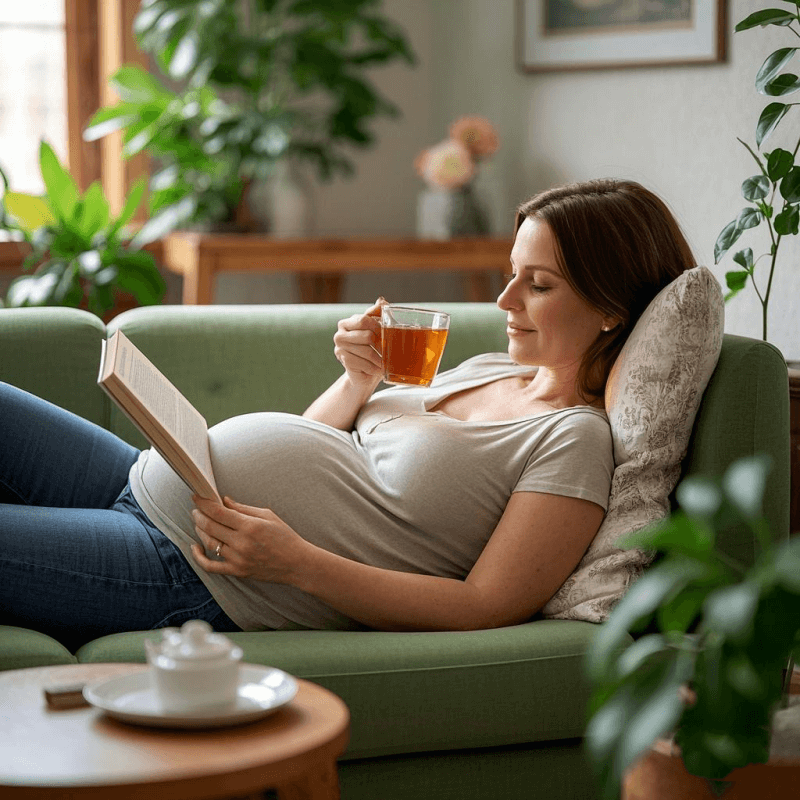1. Introduction: Why Oolong Tea and Pregnancy Sparks Concern

For expectant mothers, every food and drink choice comes with careful consideration—and oolong tea is no exception. The question of “oolong tea and pregnancy” lingers in prenatal forums and doctor’s offices alike, as women wonder if their favorite brew fits into a safe pregnancy diet.
Pregnancy brings unique nutritional needs and restrictions, especially around caffeine, which is naturally present in this beverage. While some swear by its gentle energy boost and comforting ritual, others worry about potential risks. In this guide, we’ll unpack the science, expert advice, and real-world insights to answer whether oolong tea and pregnancy can coexist safely, helping you make informed choices for you and your baby. From caffeine content to hidden benefits, let’s explore why this beloved tea has become a hot topic for moms-to-be.
2. What Is Oolong Tea? Why It’s Beloved by Women
Before diving into “oolong tea and pregnancy,” let’s clarify what makes this beverage so popular. Oolong tea is a semi-oxidized brew from the Camellia sinensis plant, falling between green tea (minimally oxidized) and black tea (fully oxidized). Its oxidation level—typically 10–80%—creates a diverse range of flavors, from floral and fruity (light varieties) to rich and roasted (dark ones).
Women often gravitate toward this tea for its balanced profile: it offers a milder caffeine kick than coffee, plus a smooth, satisfying taste that suits morning sips or afternoon relaxation. Many also appreciate its reputation for containing antioxidants, which support overall wellness. Unlike sugary drinks or overly bitter beverages, it strikes a harmonious note that fits into busy lifestyles—whether enjoyed hot on chilly days or iced during warmer months. This versatility makes it a daily staple for many, raising important questions about “oolong tea and pregnancy” safety.
3. Can You Drink Oolong Tea During Pregnancy? Evidence and Opinions
The core of the “oolong tea and pregnancy” discussion centers on safety: is it okay to include this brew in your prenatal diet? The short answer, according to most health experts, is yes—with moderation.
Pregnancy requires caution with substances that cross the placenta, but oolong tea isn’t inherently harmful when consumed responsibly. Dr. Amanda Lee, an obstetrician with 15 years of experience, explains: “For healthy pregnancies, moderate intake of this tea is unlikely to pose risks. The key is managing caffeine, which is the primary concern with any caffeinated beverage during pregnancy.”
Opinions vary slightly among practitioners. Some advise limiting all caffeinated drinks in the first trimester, when fetal development is most critical, while others emphasize overall daily caffeine limits regardless of the stage. This nuance is why understanding the specifics of “oolong tea and pregnancy” matters—context and quantity are everything when it comes to prenatal nutrition.
4. Is Oolong Tea’s Caffeine Safe for Pregnant Women?
Caffeine is the main reason “oolong tea and pregnancy” raises questions, as excessive intake has been linked to adverse outcomes like low birth weight or preterm birth in some studies. So, how much caffeine does a typical serving contain?
A standard 8oz cup of brewed oolong tea contains 30–50mg of caffeine, significantly less than a cup of coffee (which averages 95mg per 8oz) but slightly more than green tea (20–30mg per 8oz). This places it in a moderate range, but cumulative intake is what matters most. Most major health organizations, including the American College of Obstetricians and Gynecologists (ACOG), recommend limiting prenatal caffeine to 200mg per day to minimize risks.
As Healthline notes, “Staying under 200mg of caffeine daily during pregnancy is generally considered safe for most women.” For “oolong tea and pregnancy,” this means 3–4 cups (8oz each) would reach the daily limit, but pairing it with other caffeinated foods—like a square of chocolate, a soda, or a morning latte—could easily push intake over the edge. Tracking total caffeine from all sources is key to keeping this beverage safe during pregnancy.
5. Potential Benefits and Risks of Oolong Tea During Pregnancy
Like most foods, this beverage has both potential upsides and downsides when it comes to “oolong tea and pregnancy.” Understanding these can help you weigh your choices and decide if it fits into your prenatal routine.
🌟 Potential Benefits
- Hydration Support: With its high water content, oolong tea can help meet pregnancy’s increased fluid needs—especially helpful for women who struggle to drink enough plain water. Staying hydrated is crucial for amniotic fluid levels, circulation, and overall fetal development.
- Antioxidant Boost: Rich in catechins and polyphenols, this tea offers antioxidants that combat oxidative stress—a process linked to inflammation and cell damage, which can affect both mother and developing baby.
- Gentle Energy: Its moderate caffeine content can ease pregnancy fatigue without the jitters or crashes often associated with coffee, making it easier to stay active and manage daily tasks.
- Digestive Comfort: Sipping warm oolong tea may soothe mild prenatal indigestion or bloating, common discomforts in the second and third trimesters, by promoting gentle relaxation of the digestive tract.
⚠️ Potential Risks
- Caffeine Overload: Exceeding the 200mg daily caffeine limit may increase risks of preterm birth, low birth weight, or even miscarriage in some cases, according to research published in obstetric journals.
- Tannin Interference: This brew contains tannins, compounds that can bind to iron and calcium in food, potentially reducing the absorption of these critical prenatal nutrients. Iron supports red blood cell production, while calcium is vital for fetal bone development.
- Mild Diuretic Effect: While hydrating in moderation, excessive consumption can have a mild diuretic effect, increasing fluid loss and potentially leading to dehydration if not balanced with extra water intake.
Balancing these factors is key to making “oolong tea and pregnancy” a safe part of your routine.
6. Expert Recommendations: How to Enjoy Oolong Tea Safely During Pregnancy

If you want to include this beverage in your prenatal diet, follow these expert-backed tips to ensure “oolong tea and pregnancy” remains a safe, enjoyable pairing:
☕ Stick to Caffeine Limits
Aim for no more than 2–3 cups of oolong tea daily (each 8oz), and track other sources of caffeine—like coffee, soda, energy drinks, or chocolate—to stay under the 200mg daily limit. Opt for lighter oolong varieties, which often have slightly less caffeine than darker, more roasted ones.
🕒 Time Your Sips Wisely
Avoid drinking this tea on an empty stomach, as its tannins may irritate digestion or increase nausea (a common issue in early pregnancy). Instead, enjoy it 1–2 hours after meals to minimize interference with iron and calcium absorption from food. Sipping slowly also helps pace caffeine intake, preventing sudden spikes.
🍵 Choose Quality and Purity
Not all oolong tea is created equal, and quality matters during pregnancy. “Low-quality or improperly processed teas may contain pesticides, heavy metals, or other contaminants, which are riskier for expectant mothers,” warns Dr. Lee. Discover how our premium oolong tea is crafted for purity and flavor to avoid unnecessary additives or toxins.
💧 Balance with Extra Hydration
Pair each cup of this brew with a glass of water to counteract any mild diuretic effects, ensuring you stay properly hydrated. Aim for 8–10 cups of total fluids daily, including water, herbal teas, and your oolong servings, to support amniotic fluid levels and overall health.
🩺 Consult Your Healthcare Provider
Every pregnancy is unique, and individual risks vary. Discuss “oolong tea and pregnancy” with your obstetrician or midwife, especially if you have conditions like gestational hypertension, a history of preterm labor, or caffeine sensitivity. They can offer personalized advice based on your health history.
7. Real Stories: Pregnant Women Share Their Oolong Tea Experiences
Hearing from other mothers can provide valuable insights into “oolong tea and pregnancy” in real life. Here’s what women who included this tea in their prenatal routines report:
- “I drank 1–2 cups of light oolong daily during my second and third trimesters, after getting the green light from my doctor. It gave me a gentle energy boost without making me jittery, and I looked forward to the calming ritual of brewing it each afternoon.” — Rachel, 31, mom of one
- “As someone who struggled with pregnancy fatigue, I replaced my morning coffee with a small cup of oolong tea after my first trimester. Combined with plenty of water, it helped me stay alert without the crash, and my baby was born healthy at 39 weeks.” — Mia, 28, first-time mom
- “I didn’t realize tannins could affect iron absorption until my prenatal blood tests showed low levels. My doctor suggested limiting oolong to once daily, with meals high in vitamin C (which helps with iron uptake), and my levels improved quickly.” — Jamie, 34, mom of two
These stories highlight that with moderation and awareness, “oolong tea and pregnancy” can coexist successfully.
8. Conclusion: Can Oolong Tea and Pregnancy Coexist Safely?
After examining the science, expert advice, and real experiences, the answer to “oolong tea and pregnancy” is clear: yes, when consumed mindfully. Oolong tea offers hydration, antioxidants, and gentle energy that can enhance pregnancy wellness, provided you stick to caffeine limits (under 200mg daily) and choose high-quality, pure varieties.
The key is balance: avoiding excess, timing sips wisely, prioritizing quality, and consulting your healthcare provider. By following these guidelines, you can enjoy the comfort and benefits of this beverage while nurturing a healthy pregnancy.
Shop high-quality oolong tea that suits your lifestyle needs to start your safe, satisfying prenatal tea ritual. Remember, every pregnancy is different—always check with your provider to tailor choices to your unique needs.
Enjoy safe and authentic oolong tea with trusted origins and savor the moments of calm it brings during this special time.
As WebMD advises, “Moderation is key for caffeinated drinks in pregnancy—oolong tea can fit in when consumed responsibly.” Learn more about traditional oolong tea from Yihe’s curated selection to support your prenatal wellness journey.
